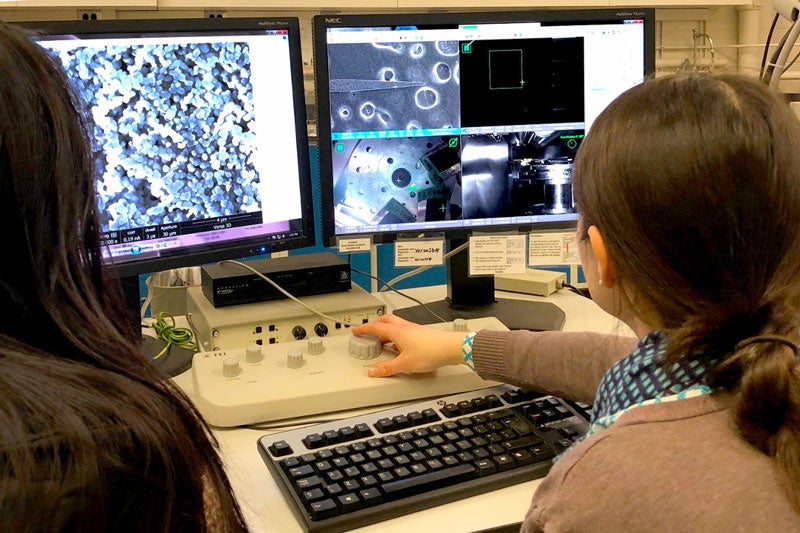
It is the mission of the Department of Materials Science and Engineering to prepare graduates for diverse careers in the fields of materials engineering.
Undergraduate students wishing to extend their education can undertake specialized study in a range of fields. These include research in ceramics, polymers, composites, nanostructured materials, high-temperature alloys, solidification, corrosion, deformation processing, welding, high-strength high-modulus materials, biomaterials, electronic materials, surface and molecular kinetics, glass science, and the origin of mechanical and physical properties in many different types of materials.
Program Educational Objectives of the Undergraduate Curriculum
While certain objectives of an undergraduate education in engineering are common to all programs, there are subtle but important differences that require some subset of objectives specific to ensuring that all graduates have specialized technical knowledge in their chosen field.
Within a few years of graduation Rensselaer's Materials Engineering degree recipients, as graduate students or professionals, will:
-
apply their knowledge and broad set of skills, including those arising from their mastery of the basic principles that underlie contemporary materials science and engineering, towards the goal of creating innovative and impactful solutions for societal needs in a broad range of career paths.
-
continue growth into leadership roles that engage teams in complex tasks, develop new paradigms, systems and/or technologies that positively impact society.
The Materials Engineering program at Rensselaer is accredited by the Engineering Accreditation Commission of ABET, under the commission’s General Criteria and Program Criteria for Materials(1), Metallurgical(2), Ceramics(3) and Similarly Named Engineering Programs.
Student Outcomes of the Undergraduate Curriculum
Students who successfully complete this program will be able to demonstrate:
-
an ability to identify, formulate, and solve complex engineering problems by applying principles of engineering, science, and mathematics
-
an ability to apply engineering design to produce solutions that meet specified needs with consideration of public health, safety, and welfare, as well as global, cultural, social, environmental, and economic factors
-
an ability to communicate effectively with a range of audiences
-
an ability to recognize ethical and professional responsibilities in engineering situations and make informed judgments, which must consider the impact of engineering solutions in global, economic, environmental, and societal contexts
-
an ability to function effectively on a team whose members together provide leadership, create a collaborative environment, establish goals, plan tasks, and meet objectives
-
an ability to develop and conduct appropriate experimentation, analyze and interpret data, and use engineering judgment to draw conclusions
-
an ability to acquire and apply new knowledge as needed, using appropriate learning strategies.
Enrollment and Graduation Data
| Enrollments | Degrees Awarded | |||||||||
| Year | 1 | 2 | 3 | 4 | UG Total | Grad Total | Bachelors | Masters (MS/MEng) | Doctorates | |
| 16/17 | FT | 21 | 24 | 31 | 38 | 114 | 43 | 29 | 6 | 10 |
| PT | 6 | |||||||||
| 17/18 | FT | 20 | 18 | 25 | 40 | 103 | 50 | 39 | 7 | 8 |
| PT | 2 | |||||||||
| 18/19 | FT | 9 | 32 | 20 | 30 | 91 | 53 | 26 | 6 | 12 |
| PT | 2 | |||||||||
| 19/20 | FT | 20 | 16 | 22 | 30 | 88 | 63 | 26 | 9 | 6 |
| PT | ||||||||||
| 20/21 | FT | 13 | 20 | 11 | 28 | 72 | 62 | 25 | 5 | 7 |
| PT | 1 | |||||||||
| 21/22 | FT | 11 | 12 | 14 | 17 | 54 | 69 | 12 | 10 | 9 |
| PT | ||||||||||
| 22/23 | FT | 107 | 60 | 68 | 136 | 371 | 94 | |||
| PT | ||||||||||
FT = full time, PT = part time
